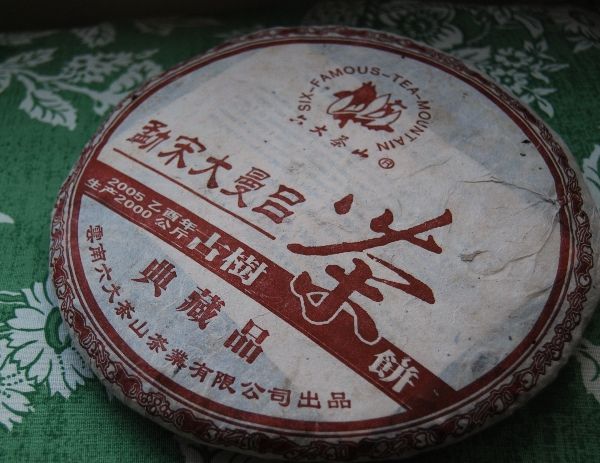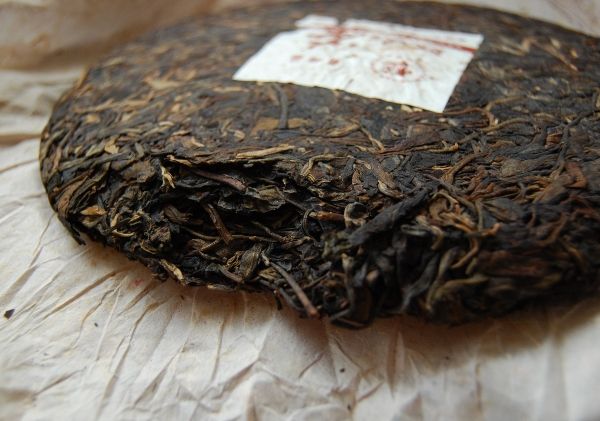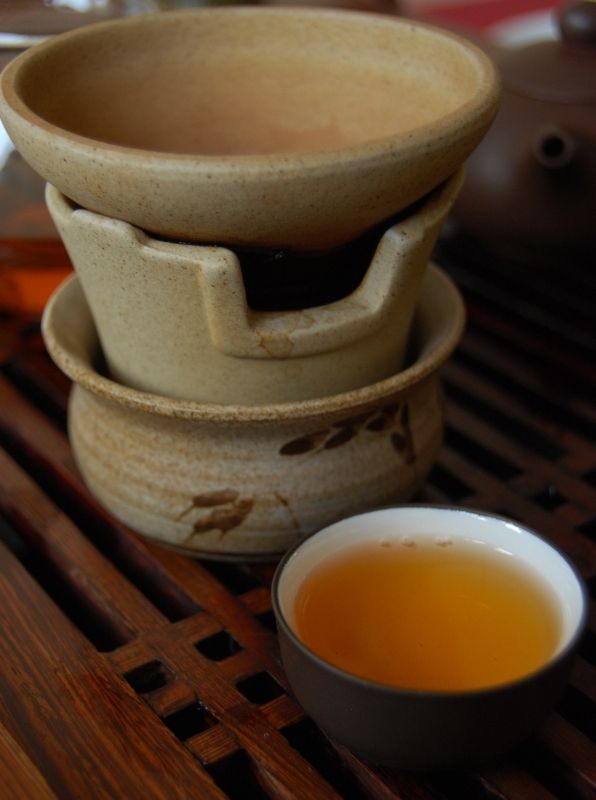*Yes, that was irony.
"Just" 2000 kg were made
Whatever your take, tea certainly has a unique charm. It would have to be charming in order for you to spend time reading about it, and for me to spend time writing about it.
I've come to appreciate that there is no such thing as a bad tea session. There can be "bad" tea, in the sense that some tea can be as rough as a French woman's legs, or as bitter as a graduate student in the liberal arts. However, even grim tea can be redeemed. A careful eye and a conservative hand can tame most leaf-based nastiness, and I find that even the cheapest "bad" tea can give you a little of that aforementioned charm at the tea-table. Maybe it's just a glimpse of that ineffable oneness (see above), maybe it's something less exalted.
The Zen writers that most appeal to me make the point that Buddha is nothing more exalted than you sitting at your tea-table. The dribble of water leaking from the lid. The crusty bit of old leaf that's stuck in the water tray. The wilted flower that dropped its petals next to the kettle.
There is no dust to transcend, I'm afraid*.
I've come to appreciate that there is no such thing as a bad tea session. There can be "bad" tea, in the sense that some tea can be as rough as a French woman's legs, or as bitter as a graduate student in the liberal arts. However, even grim tea can be redeemed. A careful eye and a conservative hand can tame most leaf-based nastiness, and I find that even the cheapest "bad" tea can give you a little of that aforementioned charm at the tea-table. Maybe it's just a glimpse of that ineffable oneness (see above), maybe it's something less exalted.
The Zen writers that most appeal to me make the point that Buddha is nothing more exalted than you sitting at your tea-table. The dribble of water leaking from the lid. The crusty bit of old leaf that's stuck in the water tray. The wilted flower that dropped its petals next to the kettle.
There is no dust to transcend, I'm afraid*.
*Just ask the sixth patriarch...
Big, clean leaves
Which brings me nicely onto the 2005 "Mengsong Big Manlu" from 6FTM. Many would consider this to be an unexalted tea. It would be hard for even the most florid and baroque of writers to imagine robed, long-whiskered scholars breaking open this cake and experiencing the one true ubermind while trying to wrestle some good brews from these aggressive leaves. Then again, I'm not convinced that such characters ever existed.
I never did believe in romantic nonsense concerning scholars and sages, and assign them more to the sentimental dreams of modern writers than to actual history. To me, scholars are real people - they spill their breakfast on the dining table, they get itches in unmentionable places, they get sunburn and hiccups and all manner of other unromantic conditions; they eat, sleep, and process food in exactly the same way that all real people do. Ditto Zen masters, devout monks, warrior-poets, and the entire panoply of overly-romanticised characters to which we are introduced in most tea writing.
If, like me, you roll your eyes and turn the page whenever a tea-book mentions the words "scholar", "ineffable", "wind soughing in the pines", or "luminous beings are we, not this crude matter", then this 6FTM cake could be for you. It's a very "real" cake.
Pure, orange soup. Limited, but very decent
This tea is clean, fat, leathery, and dark. It fights, it is "lo fi", it is brusque. I rather like it.
I would invite any ineffable sage to come and join me at my table for a pot of this tea. We would share its surprisingly complexity - hints of toffee, hints of cereal. We would enjoy its long, long huigan. We would get to grips with its substantial kuwei [bitterness]. While observing its limitations, we would enjoy it nonetheless.
Real scholars have inky fingers, stiff shoulders, and paper cuts.
Don't believe everything you read.
Don't believe everything you read.




I find it interesting that you always have something good to say about even mediocre tea—it may not be spectacular, but at least it's "real". This makes for more interesting reading, but I think it also gives the impression that all teas (except the truly bad ones) are equally good—maybe especially to novices (like me) who wouldn't know the difference. Anyway, since I won't end up trying most of these, maybe the reading is more important...
ReplyDeleteMore generally, I do like the attitude expressed in this entry. But in real life, it's very hard work to be pleased by something mediocre not despite its limitations, but because of them! (I wonder if even those humble Zen masters could do it: the same people who brought us the extravagance of chanoyu.)
P.S. I guess I'm glad I didn't go to grad school in the liberal arts!
ReplyDeleteDear DK,
ReplyDeleteI thought you were going to lament the legs of French women for a moment there. Then again, it is a statistical fact that 97.8% of my readership are Western males married to oriental females, and so I suspect this is not a common problem.
Your point is a good one, and this reflects the fact that I tend to enjoy most tea sessions. I'll pop some thoughts down in a future post, because you've got me thinking.
Toodlepip,
Hobbes
P.s. I find it endlessly amusing that some of the liberal arts students who were in my year as an undergraduate are now in the audience for some of my classes in engineering mathematics... :)
I would like to echo DK's sentiments. You have a wonderful approach to even the most "limited" tea, and your commentary raises the bar for what I would consider interesting tea chat. :)
ReplyDeleteBest wishes,
Kort
Dear Kort,
ReplyDeleteI bathe only in the reflected glory of the comments from my readers, but thank you :)
Toodlepip,
Hobbes